Session 11 - 1 Corinthians
Author
"This letter is from Paul, chosen by the will of God to be an apostle of Christ Jesus, and from our brother Sosthenes. I am writing to God's church in Corinth, to you who have been called by God to be his own holy people. He made you holy by means of Christ Jesus, just as he did for all people everywhere who call on the name of our Lord Jesus Christ, their Lord and ours. May God our Father and the Lord Jesus Christ give you grace and peace." (1:1-3)
"HERE IS MY GREETING IN MY OWN HANDWRITING - PAUL." (16:21)
Paul's authorship is confirmed by several well-known early Christian leaders. Clement of Rome (c. 95) states that the letter was by Paul and by so doing granted to 1 Corinthians the distinction of being the earliest NT book in which an extra-biblical writer attaches a name. Ignatius and Polycarp (and others) know the epistle and refer to it many times.
Date of Composition
Around 57.
Location, Purpose and Audience
The City of Corinth contained 400,000 inhabitants and was the chief city of Greece when Paul visited it. It was situated on a large isthmus (now further inland because of silting over the centuries) where the commerce of the world passed. The first settlers arrived around 4,000BC; Julius Caesar rebuilt the city in 44BC. The inhabitants when Paul visited were Greeks, Jews, Italians and a mixed multitude from just about everywhere else.
Due to its strategic location, as an agricultural and commercial centre and port, sailors, merchants, freed slaves, refugees, soldiers, intellectuals, students (and probably a few crooks) from all the world crowded into the city. Corinth was considered one of the most wicked cities of ancient times. The Christian community was surrounded by (and many came out of) heathen customs and practices. Worship of gods such as Aphrodite was prominent in the city; temple prostitution was common. The location and state of the church were far from ideal.
However, Paul is optimistic in his letter:
"He will keep you strong to the end so that you will be free from all blame on the day when our Lord Jesus Christ returns. God will do this, for he is faithful to do what he says, and he has invited you into partnership with his Son, Jesus Christ our Lord." (1:8, 9)
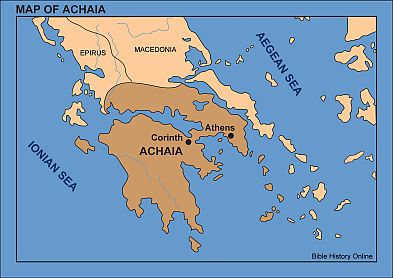
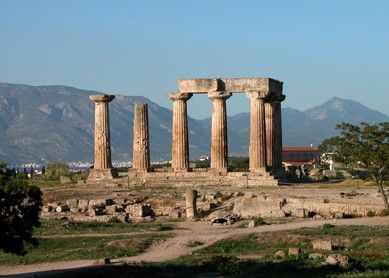
Literary Style and Structure
Paul first visited the Corinthians on his second missionary journey and was able to stay there eighteen months. He worked at his trade, a tentmaker, to provide an income. (Few social media then existed to announce the arrival of a famous apostle.)
Paul made friends with a couple named Aquila and Priscilla, who had been instrumental in discipling Apollos (Ac 18:24-27). Most likely, he left Corinth in 51. After concluding his second missionary journey, Paul again visited Asia Minor (today's Turkey) on his third journey (c. 52). This time he settled down in Ephesus for almost three years (Acts 19:10; 20:31). While in Ephesus there must have been contact between Corinth and Paul, for he speaks of the Corinthians misunderstanding a "previous letter" (now missing) in which instruction was given concerning the type of conduct that should not be tolerated in a Christian church, in 5:9. Paul had to clear up the misunderstandings, as well as address other issues - hence, what we know as "First" Corinthians was written.
The church at Corinth was composed of both Jews and Greeks (Acts 18:4). Paul refers to the Old Testament in several places (eg 10:1-13). However, it must have been predominantly Gentile since it was while Paul was in Corinth that he reiterated the proclamation which was to define his ministry, "From now on I will go to the Gentiles" (Acts 18:6; cf. 13:46). It also appears that the Judaizers had been at work in Corinth (7:18, 19).
While in Ephesus, Paul had learned about problems that had arisen in the church in Corinth, so he wrote this letter to instruct them. Members of the household of Chloe (1:11; we don't know anything else about Chloe) and other friends (16:17) came to him at Ephesus and brought news of divisions and sinful practices of certain members in the Corinthian church. The church sounds to have been polarized on a number of issues and attachment to prominent personalities in the church (these may have been based on ethnic identification).
Finally, members of the church had written Paul a letter asking his advice on certain specific matters (7:1). From all this we learn that there were at least four factions among them, 1:2; that there was open immorality occurring in the church (which was being ignored), that they were taking one another to court, and that many practical matters troubled them. Paul wrote to correct all these errors in doctrine and practice. The fact that such teaching was necessary is a further indication that most of the church was probably Gentile (ie without a background in the moral requirements of the Old Testament Law).
Structure
Opening - 1:1-3
Thanksgiving - 1:4-9
Problems of factions in the church - 1:10-4:21
Problems of behaviour and questions put to Paul: incest, lawsuits, sexual sin, marriage, food, the Lord's Supper - 5:1-11:34
Spiritual gifts - their good use & management (to ensure order - 12-14
The resurrection of Christ and Christians - 15
Collection for poor Christians; Paul's travel plans, commendations - 16:1-18
Close - 16:19-24
Key Issues
First Corinthians contains a frank discussion of the church and the issues that impacted real people in the first century. Let's look at the main ones.
Factionalism in the Church
Four distinct factions correspond to the four individuals whose teachings were followed by the respective groups: Paul, Apollos, Cephas (Peter), and Christ (one suspects that these last may have been the self-righteous ones).
Reportedly, the household of Chloe informed Paul that serious quarrels had taken place among these factions. A spirit of independent thinking and elitism (sound familiar?) emphasized so strongly by the Greeks evidently was influencing the Corinthian Christians. Not only were they forming into cliques, but the divisiveness was apparent in the way they took one another to court, and their shocking behaviour around Communion. Paul's manner of dealing with the problem is noteworthy. He does not insist that all members of the community should think alike on every subject. What he does insist on is a unity of spirit and purpose that will allow each group to learn from the others.
Paul re-focuses the church on the single centrality of Christ. He is the only foundation we have; what we build on that foundation will be tested.
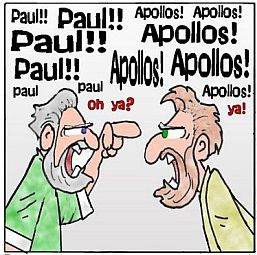
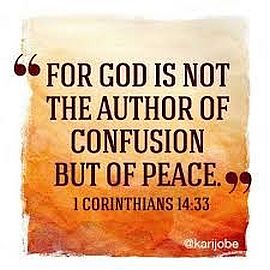
God's wisdom and Man's Foolishness
Paul does not boast about his background, persuasiveness, or use of rhetoric (in a culture that boasted of it) to bring the Corinthians to salvation. After being punished and expelled from Philippi and barely escaping similar treatment in Thessalonica and Berea, Paul arrived in Corinth, having
"... decided that while I was with you I would forget everything except Jesus Christ, the one who was crucified. I came to you in weakness - timid and trembling. And my message and my preaching were very plain. Rather than using clever and persuasive speeches, I relied only on the power of the Holy Spirit. I did this so you would trust not in human wisdom but in the power of God." (2:2-5)
The evangelists, teachers, pastors, etc. in the church had no special claims; they were simply instruments (not heroes, but "servants) to bring the message. Revelation and understanding do not come from human origins, but the Holy Spirit:
"... we have received God's Spirit (not the world's spirit), so we can know the wonderful things God has freely given us." (read the whole passage, 2:9-16)
Only Christ, and the cross, a symbol of foolishness and weakness to the Greeks, with their rhetorical and philosophical (philo + sophia, lit. "love of wisdom") approaches; and an offence to the Jews, for whom the crucifixion represented God's curse (Deut 21:23, cf Gal 3:13); to those who crucified Jesus, Calvary represented His failure; if only they had known differently!
The cross continues to offend people; it is a stumbling block (1:23). People admire clever logic or force. But, just as Jesus did not draw on His arguments or great power, so God's servants would preach a message based on God's revelation, not an egregious display of miracles. If we rely on conforming to human wisdom or meeting people's expectations, we have missed it as far as God is concerned; the two are incompatible. The challenge for us is to have another look at how we assess these things in our own lives (ie according to God's or man's ideas).
NB how odd that Paul should need to explain (again) the meaning of the cross to an existing church. It seems that they had fallen into some very deep pits in their Christian walk. There's a lesson there for us too.

If we feel weak and inadequate - that's good news, because we are in good company; God uses the weak and inadequate.
"God chose things the world considers foolish in order to shame those who think they are wise. And he chose things that are powerless to shame those who are powerful. God chose things despised by the world, things counted as nothing at all, and used them to bring to nothing what the world considers important. As a result, no one can ever boast in the presence of God." (1:27-29)
Sin in the Church
Then there is a challenge to particular sin in the community that it seems everyone knew about (to Paul's shock; some were even boasting about it): a man in the church had married his step-mother. This was a scandal, but no one had acted. What to do? Like a bad apple in a box (or yeast in dough), the contamination threatened to spread to the whole church. Paul reminds us that we (whether individually, or the people, collectively) are the temple of God and should not be polluted by sinfulness; what Christ did for us, the price He paid, is too valuable for this to happen; we need to watch our lives carefully. God once had a temple for His people; now He makes the people into His temple; we are the house of God. This principle should keep us from sin (6:12), not hundreds of rules and regulations like those published by the Pharisees.
Marriage
Paul has some interesting perspectives on marriage in Chapter 7 - remember that he was anticipating the return of Jesus at any time, so this impacted things that he wrote; he admits that, for some of the things he is writing, he is giving a personal view; for others he has a commandment from God for them.

Can I, or can't I, eat or drink this or that, as a Christian?
Eating Meat Sacrificed to Idols
Some of the Corinthians were stumbling over whether or not to eat meat that had first been sacrificed to idols, a common practice in the temple feasts (imaging buying your meat from the temple butcher and stressing about whether it was part of a pagan ritual before it went onto the shelf; this was a very real issue in the day; also discussed in Romans 14). Likewise, in our day, many Christians become conflicted about what to eat, what to drink. Paul's concern is that, while he has no problems eating from the markets, if doing so causes a fellow-Christian to fall, he will refrain. Our sense (and defence) of personal freedom should not ignore others. "Do everything with love" (16:14).
The Lord's Supper
Paul's account of the Lord's Supper (11:17-33) is one of the most quoted passages of the New Testament. The bread and wine are reminders of His sacrifice, His body, and His return. We are called to examine ourselves - appropriate given the selfish approach some had adopted. This examination is not just introspective, but a call to correct bad behaviour in the church. History reveals that many churches in New Testament times instituted "Love Feasts", meals over which they could linger longer. The whole purpose was not ceremony or division (or showing off one's affluence vis-a-vis other people), but "koinonia" (fellowship). The love feast was a great idea, unless used the wrong way.
Spiritual Gifts
The Holy Spirit distributes gifts (charismata 17 times) according to the mind and purpose of God - 1 Corinthians 12:4, 7, 11. The gifts of the Spirit (12:8-10) are in place to build up the church (individually and corporately). It is therefore important that we focus on the giver, and not the gifts. The focus is always Christ. The passage describes the giving and operation of the spiritual gifts (there may have been more than 9) mentioned as:
- diversities of gifts
- differences of administrations
- differences of operationsc
The nine can be grouped and classified as:
- Gifts of Revelation (Knowing)
- word of wisdom
- word of knowledge
- discernings of spirits
- Gifts of power (Doing)
- Gifts of utterance (Saying)
- prophecy
- tongues
- interpretation of tongues
The use and abuse of spiritual gifts in the church is treated at some length in 1 Corinthians. Taking up an analogy from the human body, in which each organ has its special function to perform and no one of them can be regarded as more vital than another, the same principle applies within the church, which is the body of Christ. Some members have the gift of prophecy, others that of teaching, and still others that of offering help in carrying forward the work of the church, and so on. Those who are apostles or prophets are not to think of themselves as superior to those who exercise other gifts, for all gifts are necessary, and the church would not be complete if any of them were missing. To those who boast that they have the gift of speaking in tongues and may therefore consider themselves in a position to exercise lordship over others, Paul writes that this particular gift, like all of the others, should be evaluated in terms of its usefulness in promoting spiritual growth and the Christian way of life.
1 Corinthians 13 - the Classic Love Chapter
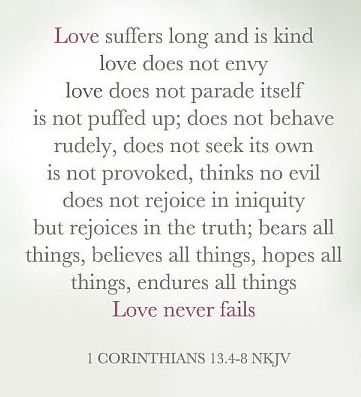
Chapter 14 describes regulation of the spiritual gifts so that there is order in the church.
Certainty of the Resurrection
"I passed on to you what was most important and what had also been passed on to me. Christ died for our sins, just as the Scriptures said. He was buried, and he was raised from the dead on the third day, just as the Scriptures said. He was seen by Peter and then by the Twelve. After that, he was seen by more than 500 of his followers at one time, most of whom are still alive, though some have died. Then he was seen by James and later by all the apostles. Last of all, as though I had been born at the wrong time, I also saw him." (1 Corinthians 15:3-8)
During the early years of the church there were people going around claiming that Jesus had already come again - but this was still in the future. Others were denying His resurrection. Pagans baptized for the dead (15:29), hoping for a resurrection one day. If Jesus' resurrection had not occurred, we would have no more Good News (15:12-29):
- our preaching is pointless
- the faith of all Christians is in vain
- God's ministers are liars
- we are still in the legal and actual clutches of sin
- Christians who have already died are "lost" for eternity - the salvation they hoped (and often suffered) for was not true after all
- we can give up living right and abandon ourselves to sin as there is no "tomorrow" -there is no rationale for "living right"
- we are to be pitied more that everyone else
Paul then goes on to describe various aspects of our future resurrection.
The resurrection of Jesus was written/reported by living eyewitnesses (read 1 Corinthians 15). The earliest documentary evidences of those statements have been dated to within 20 years of the events.
Paul's instruction to the believers was not to retreat from their city. This was not God's vision for the church (then or now). Instead, Paul directed them to live out their commitment to Christ ever more faithfully in the midst of nonbelievers (read the old life/new life comparison in 6:9-11). He expected that, as Christians, they would shine their light into the dark places of the world by worshipping in a unified community that was accountable to one another. He expected that they would settle their problems internally, that they would encourage one another in the pursuit of purity, and that they would strive together by holding tightly to the hope of a bodily resurrection to come.
By the time Paul got to write a follow-up letter to the church at Corinth (the next lesson) the issues he wrote about in his first letter had been addressed.
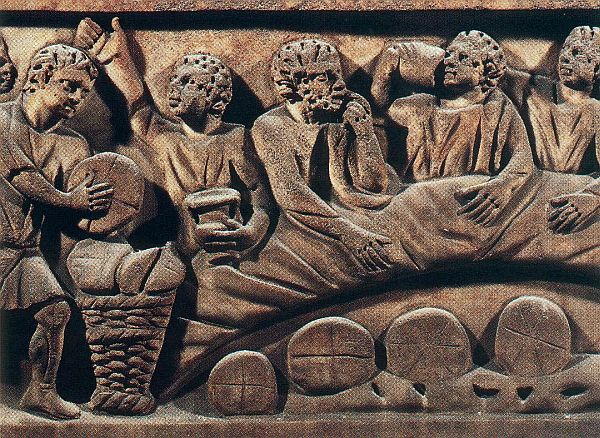
Early Christians celebrating communion and a meal
For Reflection:
- the biggest danger to the Corinthian Christians was not persecution but internal division and sin
- living for Christ in the melting pot of Corinth posed many of the same challenges we face today in the West; the teaching and principles outlined in the letter are just as relevant to us
- are you serving the Lord out of a sense of achievement; is you identity stemming from the role, or as a co-worker, a "servant" (4:1)?
- what are you building on the foundation of Christ in your life? is it likely to last or be found relatively workless? it is time to take stock
- the world around us will live for sin (5:10), but the community of God's people should not; what is the Holy Spirit showing you about where you need to change?
- we can be correct in what we say, do and allow, but still at fault if that creates a stumbling block for a weaker believer; we are called to self-sacrificial love; exercising our "rights" as Christians may lead us to behave in ways that cause others to trip up; are there people watching your life whom you need to take into account?
- knowledge can puff us up; love will build up both us and others; a better outcome
- when the church gathers together, do you look out for those who are in need?
- what does 1 Corinthians 13-style love mean for your personal relationships? (remember, there is no room for personal boasting)
- the cross comes up again and again in this letter - it teaches us how to live and die, how to lead and follow, how to love and serve
- "He will keep you strong to the end so that you will be free from all blame on the day when our Lord Jesus Christ returns." (1:8); that is a hope you can live by
"Come, Lord" (16:22) - From Aramaic, "Marana tha"
This was a common greeting among Christians in the early years
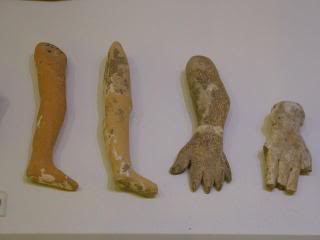
Votive offerings of hands and feet, cf 12:14-27
We are all part of one body








